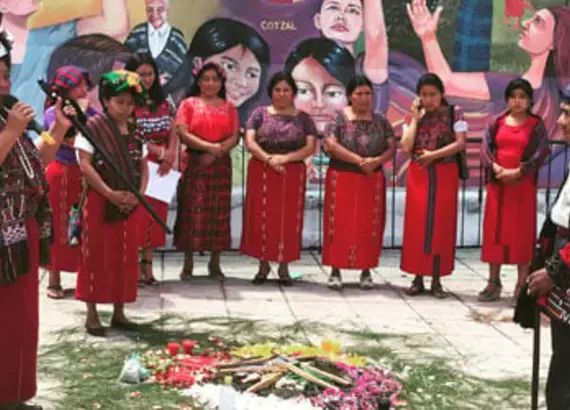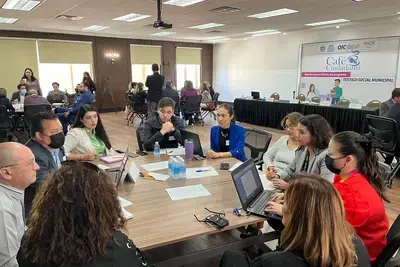
Success Story
Guatemalan Groups Launch Election Observations Amid Political Crisis
Guatemalan citizens will go to the polls on Sept. 6 amid a deepening political crisis that has seen the vice president and other key administration officials resign after being accused of corruption. The resignations come on the heels of massive anti-corruption protests, the largest protests that the country has seen in decades.
To help safeguard the integrity of the elections, two electoral observation coalitions, with NDI support, will monitor the pre-election environment as well as the electoral process and polls on election day. They will provide recommendations to improve government transparency and effectiveness and help see the country through this challenging period.
 Protesters demonstrate against corruption in front of Guatemala’s National Palace.
Protesters demonstrate against corruption in front of Guatemala’s National Palace.On April 16, 22 people were arrested following an investigation by the Office of the Public Prosecutor and the UN-sponsored Commission Against Impunity in Guatemala (CICIG) in connection with a corruption scandal that involved the current and former heads of the tax administration agency. Although Vice President Roxana Baldetti was not directly implicated, her former private secretary was linked to a criminal network that is accused of defrauding the government. She resigned after protests and pressure by civil society organizations and the private sector. The protests have continued despite the high-level resignations, and citizens are calling for the resignation of President Otto Perez Molina.
Government institutions in Guatemala also struggle with high levels of violence, opaque campaign finance practices and ineffective electoral oversight, which is compounded by corruption, organized crime and some of the highest murder rates in the world. The protests and resignations have the potential to further undermine the country's already fragile democracy, but they could also create an opportunity for much needed political reform.
Earlier this month, Mirador Electoral (Electoral Watch), a coalition of nine Guatemalan advocacy, human rights, political party training and think tank groups, launched collaborative election observation efforts. During a May 8-9 launch ceremony in Guatemala City, the nation’s capital, attendees heard from the Guatemalan election observation partners, representatives from the Supreme Electoral Tribunal (TSE), which is responsible for administering Guatemalan elections, and the ambassadors of Norway, Sweden and the United States, countries that are financially supporting NDI and Mirador.
The event also featured panels on topics of critical importance in the upcoming elections, such as electoral violence, diversity and inclusion, electoral justice and political financing. With technical support from NDI, the groups will work together to organize the comprehensive electoral observation program for the pre-election, election day and post-election periods. Efforts will include a long-term electoral observation mission in 52 municipalities and a quick count, also known as a parallel vote tabulation (PVT), designed to verify election results independently and assess voting processes on election day.
On May 19, Acción Ciudadana, the Guatemalan chapter of Transparency International, officially launched its long-term observation effort at an event in Nebaj, Quiche, a predominantly indigenous community in the interior of Guatemala with deep historical significance due to its role in the country’s 36-year civil war that ended in 1996. This effort, which goes by the tagline “Less Violence, More Inclusion,” will focus on monitoring and mitigating incidents and triggers of electoral violence at the local level and observing illegal campaign financing in target municipalities. “Less Violence, More Inclusion” is a coalition of local organizations that will work in 10 municipalities, with the possibility of expanding to an additional 10.
The event, which was held in the central plaza and was open to the public, began with a traditional Mayan ceremony led by the indigenous Ixhil community. Local delegates represented TSE, the Human Rights Ombudsman (PDH), the Presidential Commission on Human Rights (COPREDEH), local indigenous authorities and partner civil society organizations participating in the observation coalition. The launch included remarks by representatives of the United States Agency for International Development, Acción Ciudadana, TSE and organizations participating in the “Less Violence, More Inclusion” observation effort.
A key goal of the observation is to increase inclusion of historically excluded populations, such as indigenous peoples, the LGBTI community and women, in the electoral process. Observation networks include organizations and individuals that represent these populations, and the observation methodologies are being designed to collect information that takes ethnic, sexual orientation and gender identity considerations into account.
NDI, in collaboration with the International Foundation for Electoral Systems (IFES) and the International Republican Institute (IRI), is also working with women, including transgender women, to encourage them to participate in the political process as voters, election officials, observers, civic advocates, political candidates or elected officials
The elections were officially called on May 2 by TSE. An estimated eight million Guatemalan voters will go to the polls to fill nearly 4,000 public positions, including the president and vice president, 158 congressional representatives, 20 representatives to the Central American Parliament, and mayors and city councils in 338 municipalities. A run-off election is required if a presidential candidate fails to garner 50 percent of the vote, which is historically the case in Guatemala. The run-off is scheduled for Oct. 25.
Published on May 28, 2015



